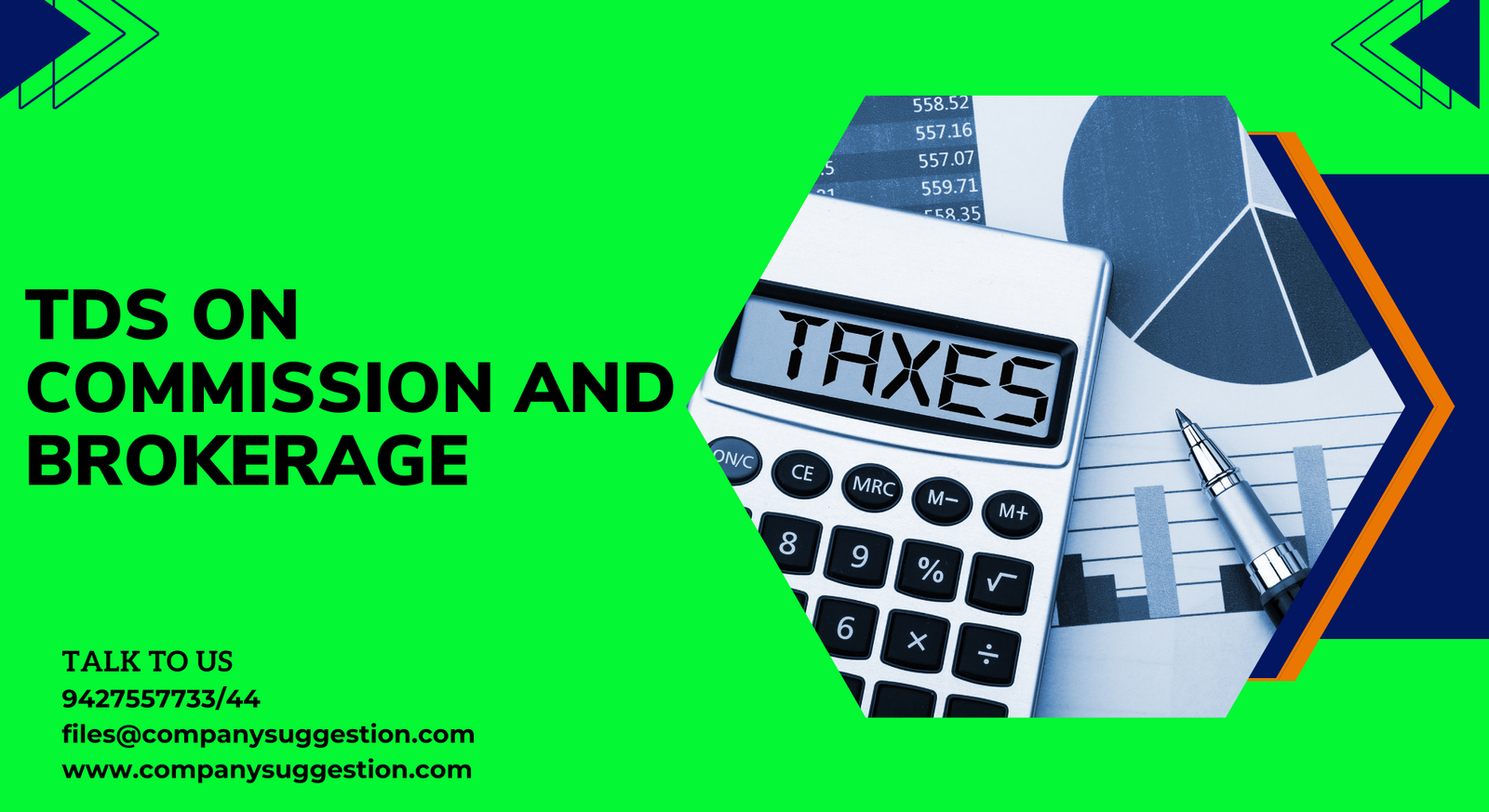TDS ON COMMISSION AND BROKERAGE
TDS (Tax Deducted at Source) on commission and brokerage is governed by the Income Tax Act of India. As per the provisions of the act, if a person or entity is paying commission or brokerage to another party and the amount exceeds a certain threshold, TDS needs to be deducted at the time of payment.
The current TDS rate on commission and brokerage is 5% under Section 194H of the Income Tax Act. However, it’s important to note that this rate may vary depending on the nature of the transaction and the tax laws applicable at the time.
Section 194H of the Income Tax Act, 1961, lays down provisions for the deduction of tax at source (TDS) on income by way of commission or brokerage. Let’s delve into the detailed provisions of this section:
- Applicability: Section 194H applies to any person, other than an individual or a Hindu Undivided Family (HUF), who is responsible for paying any income by way of commission or brokerage.
- Threshold Limit: TDS under Section 194H is applicable if the aggregate amount of commission or brokerage paid or credited during the financial year exceeds Rs. 15,000. If the total payment does not exceed this threshold, TDS is not required to be deducted.
- Rate of TDS: The TDS rate under Section 194H is currently 5% of the amount paid or credited as commission or brokerage.
- Time of Deduction: TDS is required to be deducted at the time of credit of such income to the account of the payee or at the time of payment, whichever is earlier. This means that the person responsible for making the payment must deduct the TDS either when the commission or brokerage amount is credited to the payee’s account or when the payment is actually made, whichever occurs first.
- Mode of Payment: The person deducting TDS is required to deposit the deducted tax amount to the credit of the Central Government within the prescribed time frame. TDS payments are generally made electronically through online banking channels or designated bank branches.
- TDS Certificate: The deductor is required to issue a TDS certificate to the payee in the prescribed form, specifying the amount of TDS deducted. This certificate serves as proof of TDS deduction and can be used by the payee while filing their income tax returns.
- Exemptions and Exceptions: Certain exemptions or lower TDS rates may apply under specific circumstances, such as payments made to insurance agents under certain conditions. Seductors should be aware of any exemptions or exceptions applicable to their transactions.
- Penalties: Failure to deduct TDS or deposit it to the government within the stipulated time frame can attract penalties and interest as per the provisions of the Income Tax Act.
- Reporting and Compliance: Deductors are required to comply with reporting requirements and ensure timely deposit of TDS to avoid any legal repercussions. Payees need to include the TDS details in their income tax returns and claim credit for the tax deducted at source. Rate and time of deduction of section 194h
Rate and time of deduction under section 194h
- Rate of TDS: The current rate of TDS (Tax Deducted at Source) under Section 194H is 5%. This means that if a person is responsible for paying any income by way of commission or brokerage, they are required to deduct TDS at a rate of 5% on the amount paid or credited as commission or brokerage.
- Time of Deduction: TDS is required to be deducted at the time of credit of such income to the account of the payee or at the time of payment, whichever is earlier. This means that the person responsible for making the payment must deduct the TDS either when the commission or brokerage amount is credited to the payee’s account or when the payment is actually made, whichever occurs first.
Cases wherein TDS not to be deducted under section 194h
Under Section 194H of the Income Tax Act, there are certain cases where TDS (Tax Deducted at Source) is not required to be deducted. Here are some scenarios where TDS is not applicable under Section 194H:
- Individuals and HUFs: TDS under Section 194H is not applicable if the commission or brokerage is paid to individuals or Hindu Undivided Families (HUFs). This section specifically applies to payments made to persons other than individuals and HUFs.
- Below Threshold Limit: TDS is not required to be deducted if the aggregate amount of commission or brokerage paid or credited during the financial year does not exceed Rs. 15,000. If the total payment remains below this threshold, TDS is not applicable.
- Exempted Payments: Certain types of commission or brokerage payments may be exempted from TDS under specific circumstances. For example:
- Commission or brokerage paid to a mutual fund distributor under a mutual fund transaction if the distributor has furnished his PAN to the deductor.
- Commission or brokerage received by an insurance agent or insurance intermediary if the commission or brokerage is received from the Life Insurance Corporation of India or an insurer.
- Commission or brokerage received by an agent of a foreign exchange purchased or sale transaction under FEMA, 1999 (Foreign Exchange Management Act, 1999).
- Non-Applicability in Certain Transactions: TDS under Section 194H may not be applicable in certain transactions where the payment does not fall under the definition of commission or brokerage as specified in the section. For example, payments made for services rendered that do not qualify as commission or brokerage would not attract TDS under this section.
It’s important for Deductors to thoroughly examine each transaction to determine whether TDS is applicable under Section 194H and whether any exemptions or exceptions apply. Compliance with TDS provisions is essential to avoid penalties and ensure adherence to tax regulations. Consulting with a tax professional can provide further clarification on specific cases where TDS may not be required to be deducted.
Our experts of team will guide you related to compliances of Companies, Firms and other entities if you have any doubt regarding this, then you can send your doubts on company suggestion and clear it.













